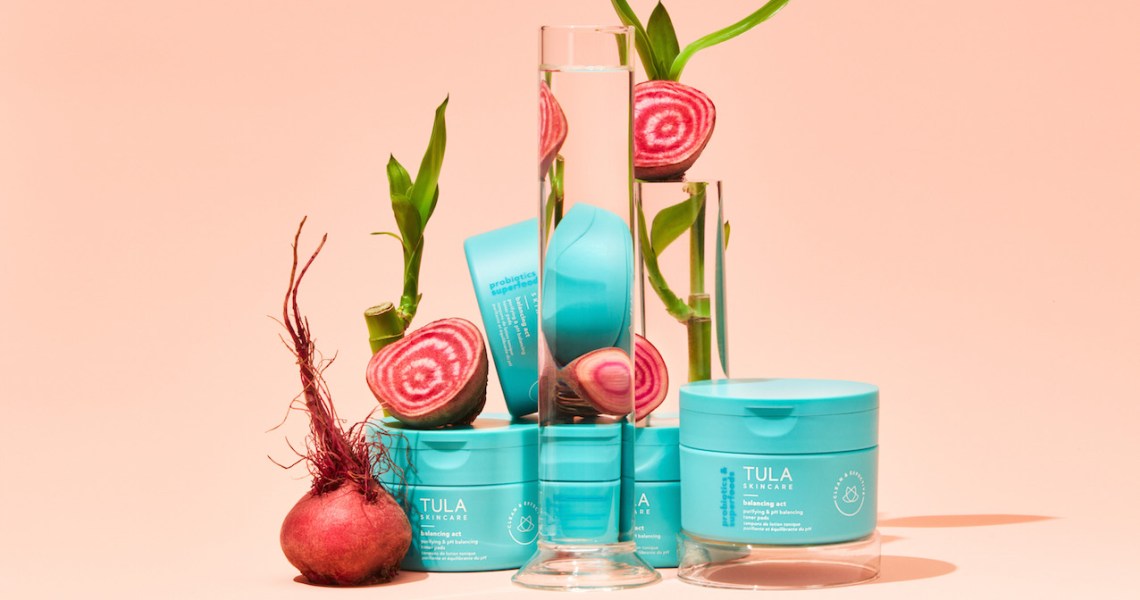On Wednesday, clean skin-care brand Tula introduced several eco-friendly initiatives as the brand aims to become more sustainably-minded.
Tula linked with TerraCycle to encourage customers to recycle its products by sending them to TerraCycle for free after use. (Packaging is shredded and converted into plastic park benches and tables upon receipt.) The brand also signed up with Cloverly, which allows customers to offset shipping carbon emissions during checkout for a fee (less than $1). Working with the Sustainable Forest Initiative and the Forest Stewardship Council, Tula is phasing in cardboard packaging sourced from responsibly managed forests to prevent biodiversity loss. In addition, Tula launched a biodegradable toner pad product for $36 on Tula.com — the pads can biodegrade in a landfill or at-home composting. The primary container can also be refilled with pads, with refill pads becoming available at the end of March. This week, the brand added a dedicated sustainability page to Tula.com.
“The fastest, most effective and impactful way [for us] to make progress in sustainability is via partnerships with experts,” said Savannah Sachs, CEO of Tula. “When you read about the psychology of human behavior around recycling and sustainability, one of the biggest takeaways is that making it simple and easy is absolutely critical [to adoption]. We felt this was the highest-impact way to take a step forward, because it would be so simple and free for the consumer.”
Sachs said that Tula is investing $250,000 across all its eco-friendly partnerships and initiatives during the first 12-months. Tula sales have grown by 300% year-over-year for the last three years in a row, with DTC e-commerce comprising over 50% of its sales, she said. Sachs added that the brand is in discussions with TerraCycle about its Loop program, the closed-loop system that enables customers to send back brand packaging to be reused and refilled by the brand.
According to a new study by IBM and the National Retail Federation, released in January, nearly 70% of consumers in the U.S. and Canada think it’s important that a brand is sustainable or eco-friendly. Another 57% of them are even willing to change their purchasing habits to reduce negative environmental impact.
Based on the changing tide of consumer values, it is an apt time for Tula’s first attempts at building sustainability into the heart of a product. For the toner pads’ launch on Wednesday, Tula used email marketing to announce the product and gifted the pads to 750 influencers, who received a commission through the brand’s affiliate marketing channel. Over 50% of Tula’s revenue is through influencer affiliate marketing, said Sachs.
“We were trying to think about the beauty industry and areas where it is currently having the most impact on the environment. Single-use wipes [came to mind], because [between] facial wipes, toner pads, cotton pads — it all adds up,” said Sachs.
Ad position: web_incontent_pos1
Biodegradable products and packaging is the latest sustainability area where the beauty industry has focused its attention lately. But, with every packaging solution put forth — including bio-plastics, refillable bottles and reusable items — there is inevitably a downside. U.S. waste disposal and management is a highly complex system, and the U.S. generates more than 258 million tons of municipal solid waste each year. Some of that waste is recycled, some of it burned for energy, and the rest is placed into landfills. Only waste sent to landfills will biodegrade, and only under proper management where materials are exposed to oxygen can decay.
“Many biodegradable plastics and other materials need to be processed in an industrial facility,” said David Pinsky, senior plastics campaign manager with non-profit environmental group Greenpeace USA. “If you try to bury it in your backyard, it [can still end up] in our rivers or waterways and our oceans; oftentimes they will mimic traditional plastics, and some marine life will ingest them and be harmed by them.”




